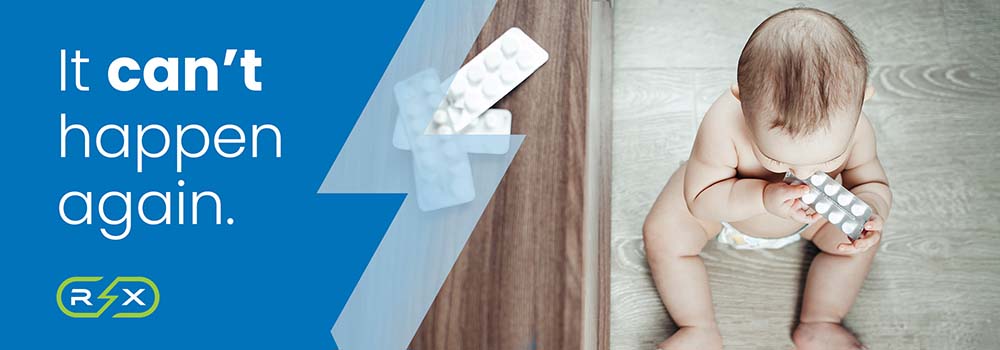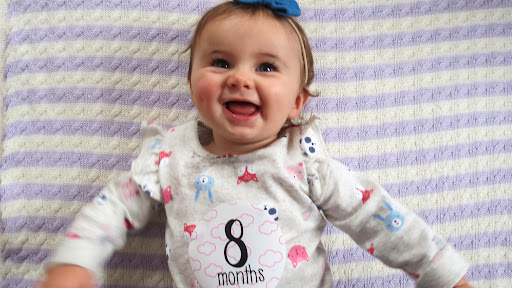
- Details
- By Milt Dallas, Founder of Rx Destroyer
Maisie was only nine months old when she passed.
She had just learned to crawl. At a holiday gathering at a neighbor's home, she delighted the room with her little wobbles across the kitchen floor. Six adults, three of them doctors, watched her lovingly.
But a pill, dropped and forgotten by a visiting relative, found its way into Maisie’s tiny hand. Then into her mouth. Her parents put her to bed like any other night. She never woke up.

I don’t share that story lightly. It’s painful. But it’s common.
About 60,000 young children each year end up in emergency rooms due to unintentional medication ingestions. That’s roughly four school buses a day heading straight for the ER.
I’m Milt Dallas. I grew up on the Onieda Reservation just outside Green Bay, Wisconsin. I started Rx Destroyer, a safe medication disposal company to help end the opioid epidemic.
We understand that children in particular are at risk when medications are not safely stored or controlled and that in a huge number of overdose cases, ingestion is unintentional. Maisie’s story reminds us that safe control of medications is critical, as one forgotten pill can take a life.
Our homes often have multigenerational visitors, kids visiting grandma, aunties and uncles stopping by, and those “just in case” pills in a nightstand or coat pocket become ticking time bombs. Maisie wasn’t in a drug house. She was at a family dinner. Then everything changed... think about that.
Native communities face the highest overdose death rates in the country. Our youth are especially vulnerable; nearly one in five Native young adults has a substance use disorder. But only 3.5% of those who need treatment actually receive it. As most have experienced, the system is not great and we’re tired of waiting for someone to stand and fix it.
We know the pain. But we also know, being sovereign nations, we have the power in our own communities to make changes now. It starts in our homes, with the way we store, share, and dispose of medications.
Below is a list of six life-saving tips to safeguard your children and home from accidental opioid overdoses:
How to Make Your Home Safer Today
1. Keep Meds Up and Away
Store all medicines, including herbal and over-the-counter remedies, out of sight and reach, ideally in a locked drawer or high cupboard. Even common items like ointments or eye drops can be dangerous if swallowed by a child. Always return meds "up, up and away" immediately after use.
2. Lock It Up
Use child-resistant packaging and consider a lockbox, especially for opioids, anxiety meds, or stimulants. Remember: "resistant" isn’t "childproof." A determined toddler can and will try till successful.
3. Watch the Purses and Pockets
An alarming proportion of child poisonings occur when kids ingest medicines found in purses or bags left within reach (aafp.org). Visitors often carry medications in bags or coat pockets. Provide a secure space for guests to store belongings, out of children's reach.
4. Never Keep Pills “Handy”
A study found many pediatric poisonings happened because caregivers got distracted and didn’t put medicines “back up” right away. That nightstand, kitchen drawer, or bathroom counter isn’t safe storage. Before gatherings, sweep the house from a toddler’s point of view, looking for pills on the floor or low furniture.
5. Dose Carefully
If administering medication to your child, use only the dosing tools provided. Clean up spills immediately, since many children’s medicines are flavored and sticky, spills can draw the attention of curious little ones. Avoid calling medicine “candy.” Chewable or gummy vitamins may look harmless, but in large doses, they can be toxic or even deadly.
6. Teach and Prepare
Help kids understand that they should never touch pills. Teach them to bring anything that looks like medicine to the attention of an adult. Keep the Poison Control number visible: 800-222-1222. And if there’s ever an emergency, call 911 without hesitation. Having a plan and quick access to help can be lifesaving.
Thankfully, most children who ingest medicine do survive with prompt medical care (healthychildren.org), but the goal is to prevent the scare and trauma altogether.
Maisie’s parents had taken precautions in their own home. But her story reminds us that the risk doesn’t stop at our front door. It’s just as important to have honest, sometimes difficult conversations with friends and family about how medications are stored and disposed of. A single pill in the wrong place can change everything.
Why Safe Disposal Is Just as Critical
Just as important as safe storage is safe disposal. Stockpiling or holding leftover meds is dangerous. Yet, in remote areas, including many reservations, drop-off sites are scarce or unavailable.
What about flushing? Flushing not only poisons our water, but also any plants, animals or aquatic life that comes into contact with that substance. Many of our biological cousins are poisoned by the same drugs that help us to sleep, cure infections, help us reproduce, or manage mental and physical conditions.
That’s why Rx Destroyer makes eco-friendly drug disposal products that work right at home. Pour the pills in, seal the bottle, and toss it into common trash when full. Saving water and lives is that simple.
Maisie’s story haunts me because it could happen in any of our homes. But we can prevent it. We can protect our kids and honor our ancestors in the same breath by changing our medication disposal and storage behaviors today.
To all Native leaders: please help your communities safely store and dispose of unused medicines by sharing resources and information. Federal and opioid settlement funds have been widely distributed--use those resources to protect your tribe, your people, your lands..
If you want a safe, easy-to-use disposal product for your home, reach out to your tribal health department. If they don’t have one, ask them to contact us.
This isn’t about a product. It’s about protecting our next seven generations. And it starts today.
Help us defend tribal sovereignty.
At Native News Online, our mission is rooted in telling the stories that strengthen sovereignty and uplift Indigenous voices — not just at year’s end, but every single day.
Because of your generosity last year, we were able to keep our reporters on the ground in tribal communities, at national gatherings and in the halls of Congress — covering the issues that matter most to Indian Country: sovereignty, culture, education, health and economic opportunity.
That support sustained us through a tough year in 2025. Now, as we look to the year ahead, we need your help right now to ensure warrior journalism remains strong — reporting that defends tribal sovereignty, amplifies Native truth, and holds power accountable.
 The stakes couldn't be higher. Your support keeps Native voices heard, Native stories told and Native sovereignty defended.
The stakes couldn't be higher. Your support keeps Native voices heard, Native stories told and Native sovereignty defended.
Stand with Warrior Journalism today.
Levi Rickert (Potawatomi), Editor & Publisher
